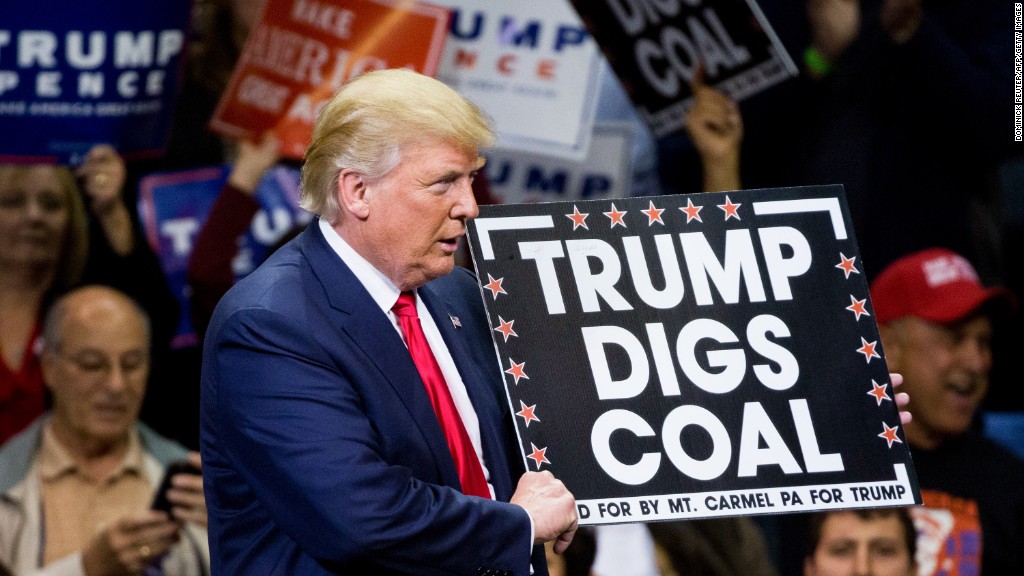
Alpha Natural Resources filed for bankruptcy two years ago when the American coal industry went into free fall.
Now a revamped version of the coal mining company is planning to go public on the New York Stock Exchange. And it's giving a lot of credit to President Trump for what it sees as its strong prospects.
Contura Energy (CNTE), which acquired Alpha's core assets in bankruptcy, said it plans to raise as much as $162 million in an initial public offering as soon as next week.
The White House plays a starring role in Contura's IPO paperwork.
"Trump" is mentioned 13 times in the filing, while "current administration" is cited another five times. Most of the mentions highlight Trump's deregulation efforts.
"The coal industry is expected to benefit from a reduced regulatory burden via recent and ongoing legislative and administrative action," Contura wrote in the prospectus.
Contura highlighted Trump's repeal of the Stream Protection Rule, an Obama-era environmental regulation that the company said would have made 60% of existing coal reserves "uneconomic to produce."
Trump has also moved to undo Obama's Clean Power Plan, which would have encouraged utilities to move away from coal because of its high carbon emissions. Killing this environmental program "should ease the pressure on coal-fired utilities to retire units prematurely," Contura said.
The company also reminded Wall Street that Trump announced on June 1 that the United States will withdraw from the Paris climate accord.
Related: John Oliver sued by coal CEO claiming 'character assassination'
Contura is poised to become the third American coal mining firm to go public this year, joining Ramaco Resources and Warrior Met Coal (HCC), which formed from the ashes of bankrupt Walter Energy.
While still a shell of its former self, the coal industry may be stabilizing after years of destruction.
"It's definitely on the rebound. It's hard to say it's not," said Andrew Cosgrove, senior metals and mining analyst at Bloomberg Intelligence.
How much credit does Trump deserve for the string of coal IPOs?
"This is a function of economics, not policy," said Cosgrove.
Trump has repeatedly blamed coal's downfall on overregulation, dubbing it Obama's "war on coal." But a Columbia University study found that the abundance of cheap natural gas, not regulation, was the biggest catalyst for coal's collapse.
Natural gas isn't as much of a problem for this year's coal IPOs because they make most of their money from metallurgical coal, not thermal coal. So-called met coal is used to make steel and it's more valuable in part because it's not a competitor to natural gas.
Met coal prices spiked to a record in November after China cut production to ease a glut. Prices soared again in April, nearly breaking the record again, after a cyclone in Australia wiped out production.
Trump's June 1 speech on the Paris agreement hailed the opening of a "brand new mine," referring to a met coal mine in western Pennsylvania that was later opened by Corsa Coal.
Related: Trump's right: A coal mine is opening soon
Another key is that the bankruptcies allowed these companies to start fresh. The companies that have emerged from bankruptcy are saddled with less debt and more sharply focused on the most profitable coal plays.
"A lot of these companies piled on too much debt. The entire industry was overbuilt," said Cosgrove.
Contura is still dealing with the health costs associated with the dangerous mining work of Alpha Natural Resources. Contura listed unfunded obligations of $20.8 million of workers' compensation and $13.8 million of black lung obligations linked to liabilities it assumed from Alpha.
Wall Street is hoping Contura has more success as a public company than Ramaco Resources (METC), which has struggled badly since going public in February. Ramaco lost more than half its value since debuting, making it 2017's worst-performing IPO, according to Renaissance Capital.
"Even Snap and Blue Apron have done better," said Kathleen Smith, a principal at Renaissance Capital, which manages ETFs that track IPOs.


